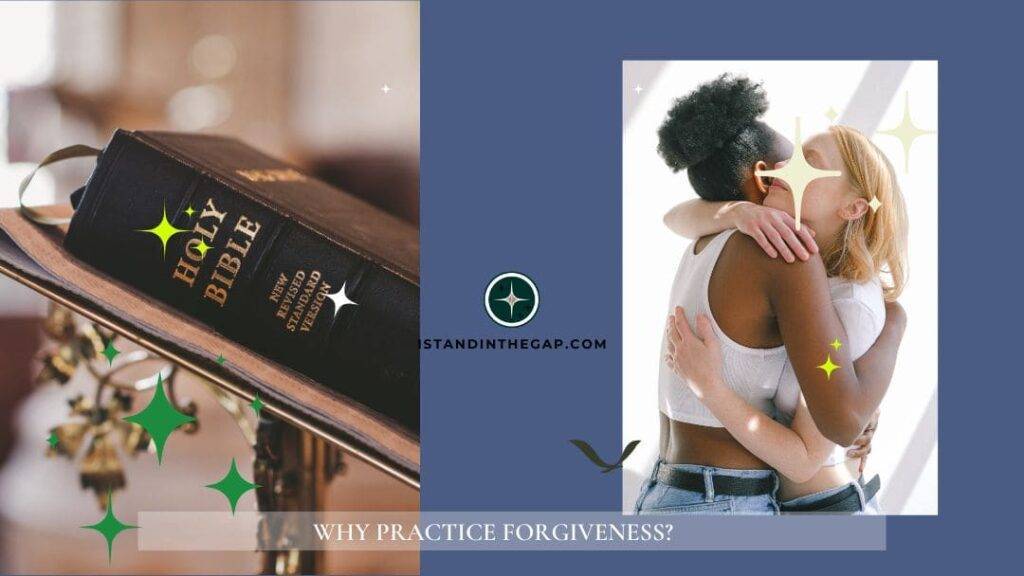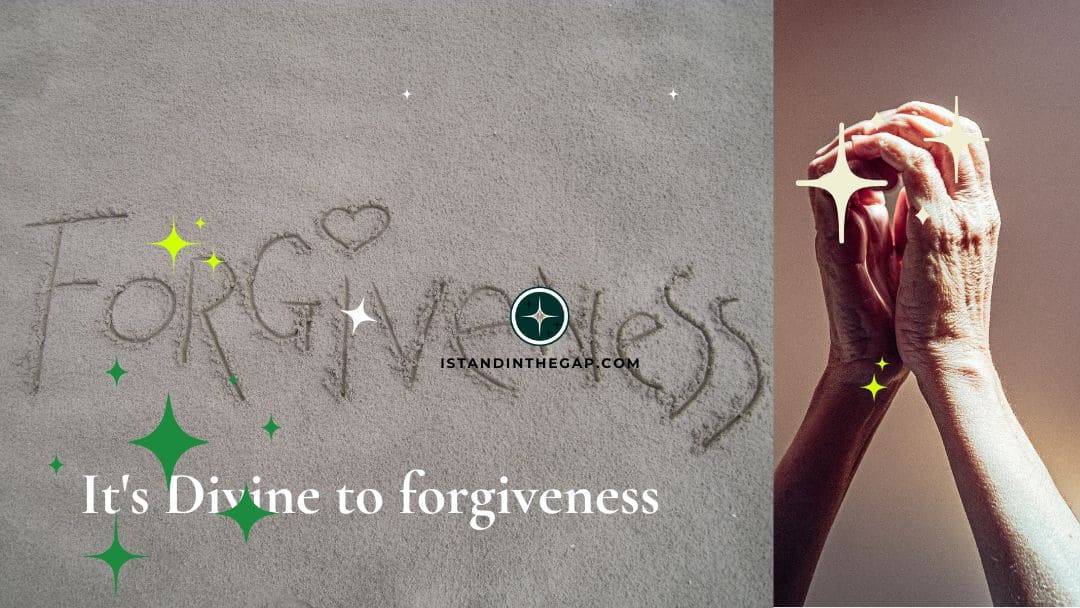Yearning to be free of your resentments and forgive? Great news! Well, forgiveness is not always easy, but it is necessary for personal growth and freedom, hence the need to know how to forgive and let go.
In this work, we will explore three simple steps to help you forgive those who have hurt you and move forward with a renewed spirit.
Let’s get started!
Key Takeaways:
- Forgiveness is an important aspect of Christianity, and it begins with admitting the problem and acknowledging the hurt caused.
- The next step is to pray and release the pain to God, taking the decision to forgive through prayer.
- Remaining focused on forgiveness is crucial, and we can do this by following the example of Christ and continuously forgiving others, including ourselves.
Understanding Forgiveness as a Christian
Understanding forgiveness as a Christian means acknowledging that forgiveness is deeply rooted in the Christian faith. It is a crucial aspect of Christian teachings and is seen as a divine path to spiritual growth and emotional healing.
Essentially, forgiveness is letting go of anger or resentment towards someone who has wronged you.
In order to understand forgiveness better as a believer, it is important to understand how it works.
See, forgiveness is not excusing or justifying someone’s actions, nor is it forgetting what they have done. Instead, forgiveness involves, firstly, acknowledging the wrongdoing, then admitting the pain it has caused you, and finally, deciding to release the anger and bitterness.
This process allows the believer who has been hurt to heal and move forward in a positive godly way.

Basically, the reasons behind forgiveness are numerous and wide, but one of the key reasons is the call, in the Bible, to be kind and tenderhearted toward others, as taught by Paul:
31 Let all bitterness, wrath, anger, clamor, and evil speaking be put away from you, with all malice. 32 And be kind to one another, tenderhearted, forgiving one another, even as God in Christ forgave you.
Ephesians 4:32 (NKJV)
Additionally, forgiving those who have wronged us allows us to be forgiven by God for our own sins – this is explicitly stated by Jesus in the Lord’s Prayer. That aside, it also frees us from being trapped in the cycle of anger and bitterness and opens up new opportunities for growth and healing.
If you are struggling to forgive in any way, I propose three simple steps you can take as a true Christian to deal with it.
- Firstly, admit that there is a problem
- Secondly, pray to release yourself from the pain and bitterness caused by past offense or offenses.
- Finally, focus on the teachings of Jesus Christ and strive, with the help of the Holy Spirit, to embody his forgiving nature.
Note that the last step may include seeking counseling or spiritual guidance, from trusted sources, to help you walk free from the trap of unforgiveness.
Remember that forgiveness is not mystical or unattainable; it is a personal, yet divine choice that the believer makes to free him or herself from the burden of anger and resentment.
Now the details of the steps mentioned above:
Step 1: Admitting the Problem
The Believer has to Admit the Problem of Unforgiveness
Forgiving someone who has wronged you can be a difficult and emotional process, that takes much effort. However, holding onto anger and resentment can cause more harm than good, leading to a spiral of negative thoughts and emotions.
This is why admitting the problem of unforgiveness is the first step towards forgiveness.
When you admit the problem, it means you’re acknowledging the hurt that was caused, and in turn, accepting the need to move forward.
Simply put, it requires taking sole responsibility for your own emotions and choosing to let go of the negative feelings and thoughts that are holding you back.
This step is very crucial because it sets the foundation for the rest of the forgiveness process to be effected.
In order for this step to work, it’s important for the believer, to remember that forgiveness is not about excusing the other person’s behavior, but rather about divinely releasing the hold that it has on you as a person.
It’s also important, to be honest with yourself about the problem and how it has affected you while avoiding harsh words or slander towards the person who wronged you.
For you to successfully admit the problem, it may be helpful, at times, to take time to reflect and pray to your Father in Heaven, asking for guidance and strength. By staying focused on your own emotions and needs, you can begin to take the first step toward forgiveness and healing.
Ephesians 4:31-32 and Acknowledging the Hurt
Here is a 6-step guide on how to practice Ephesians 4:31-32 and acknowledge the hurt:
- Name your feelings. Express and clarify the emotions that you are experiencing.
- Acknowledge the actions or words that caused hurt.
- Understand why those actions or words were hurtful.
- Identify how this experience has impacted you emotionally, mentally, or physically.
- Take responsibility for your own thoughts and feelings without blaming anyone else.
- Ask yourself if there’s anything else you need in order to feel at peace.
By practicing these steps, you’ll be allowing yourself to not only identify your emotions but also understand how you’re feeling in depth.
Practicing Ephesians 4:31-32 and acknowledging the hurt can be challenging as it requires one to dig deep into ones emotions, but doing so will help you move forward from negative feelings such as rage, resentment, or evil behavior.
It may be difficult to face certain emotions related to past hurt, but it’s important in order for true forgiveness to occur. Taking time to acknowledge what has happened allows you to truly forgive instead of simply moving on, and ignoring, without closure.
By applying these steps mentioned above, one can find emotional resolve for lifelong emotional inner peace.
Don’t let the fear of missing out prevent you from practicing Ephesians 4:31-32 and acknowledging the hurt towards someone who has wronged you earlier in your life.
This is to say, you have to make space for better things by forgiving past grievances today, not tomorrow!
Step 2: Praying and Releasing the Pain
The Believer has to pray and release the pain.
See, the process of forgiving involves praying and releasing the pain. This critical step plays an essential role in letting go of the hurt and moving forward with a clear mind and an open heart.
At this stage, you only allow yourself to acknowledge the pain, confront it, and ultimately release it.

We are well aware that praying is a powerful tool that can help you unlock your spiritual self, thereby allowing you to gain a new perspective on your situation.
It can help you access the strength and focus you need to face the pain and let go of it. During this step, you can take time to reflect on the experience, the pain, and the consequences, and then connect with a higher power, God, and ask for His divine guidance and support.
Releasing the pain involves recognizing that holding onto hurt and resentment only harms yourself, and no one else.
It is a crucial step that helps you overcome the negative emotions you might have associated with the bad experience. By doing so, you come to a realization that the pain you carry only chains you down, preventing you from moving forward toward a brighter and hopeful future, and no one else.
To complete this step, you can try to visualize the pain leaving your body like a heavy weight being lifted off your shoulders or a dark storm cloud disappearing in the sky. Once you have done this, you can take a deep breath and embrace this new, refreshing sense of freedom and peace, given to you by God.
As you work through this step, remember to be kind to yourself, to take your time, and don’t expect immediate results. Remember, it’s a gradual process.
Listen, the forgiving process is a journey, and it could be long and meandering, and everyone’s journey is different. Try incorporating daily affirmations and positive self-talk into your routine, and consider seeking support from a Christian counselor or therapist.
Remember, letting go of hurt and pain can be very challenging, but it is a vital step in achieving freedom from it. By praying and fasting, and releasing the pain, you can create a fresh start and embark on a new godly path toward a joyful and fulfilling Christian life.
Mark 11:25 and Taking the Decision to God
And whenever you stand praying, if you have anything against anyone, forgive him, that your Father in heaven may also forgive you your trespasses.
Mark 11:25 (NKJV)
When it comes to forgiving someone, the decision may be tough, but it is essential if you want to move forward in your life.
The verse above says that when you pray, forgive those whom you have anything against so that your Father in heaven will remove any barriers between Him and you.
Essentially, forgiveness is important not only for the person who has wronged us but also for our own spiritual growth.
To help ease the process of making this difficult decision, here is a 5-step guide on how I took my decision to God:
- I found a quiet space where I could be alone with God.
- I acknowledge my pain and what the person did to hurt me.
- I then sought peace within myself and from God.
- I truthfully prayed for the person who wronged me and asked God for guidance in forgiving him.
- After that, I trusted in God’s timing and plan.
Beloved, it may not be easy at first, but bringing yourself before God with a willingness to forgive is an excellent way to release any hurt or anger that has built up over time.
In this way, Mark 11:25 reminds us that forgiveness should not just exist as an intention but should become an action.
Trust me, forgiveness doesn’t come easy; it takes a lot of strength and vulnerability to let yourself go through the process. Though it may seem hard initially when you release all emotions before God and express everything through prayer, healing begins gradually.
If praying alone feels challenging, you can try connecting with others who share their stories on forgiveness through Christian support groups or counseling sessions.
Sharing such experiences creates solidarity among individuals in similar situations who are looking for wisdom about what works best for them.
Step 3: Remaining Focused
It is pertinent that the Believer remains focused on the process
Remaining focused is the final and most crucial step in the process of forgiveness. This step plays a vital role in helping us move forward and avoid dwelling on our past hurt or resentment.
By remaining focused, we can leash our mind from wandering back into negative thoughts about the offender or the past events.
Once we have understood the past hurt and made a conscious decision to forgive, the third step is to remain focused on our goal of forgiveness.
The thing is, staying focused requires a shift in mindset – from thoughts of anger, resentment, and blame to those of empathy, gratitude, and positivity. This mental shift allows us to move beyond the hurt, and establish a new divinely orchestrated beginning.
Remaining focused can be achieved through various techniques such as daily meditation, reading aloud the Bible, writing a gratitude journal, or practicing mindfulness.
Mindfulness entails paying attention to the present moment and accepting your feelings without judgment. Techniques like these enhance our ability to be present, reduce negative self-talk, and ultimately foster forgiveness.
To remain focused, you can also try building healthy routines that promote self-care, ongoing personal growth, and positive energy. You could try practicing positive self-talk to help you stay focused, appreciate the little joys of life, or even reach out to a support group or a trusted friend.
These practices of self-love and focusing on the positives can help with forgiveness and overall well-being.
Matthew 18:21-22 and How to Forgive Continually
21 Then Peter came to Him and said, “Lord, how often shall my brother sin against me, and I forgive him? Up to seven times?” 22 Jesus said to him, “I do not say to you, up to seven times, but up to seventy times seven.
Matthew 18:21-22 (NKJV)
Matthew 18:21-22 talks about how important it is for us to forgive others.
Here’s my six-step guide on how we can follow Matthew 18:21-22 and continue to forgive:
- Acknowledge the hurt: take some time to reflect on what happened and understand how you feel.
- Decide to let go of resentment: forgiving someone doesn’t mean forgetting what they did or excusing their behavior; it means choosing not to hold onto bitterness.
- Practice empathy: try to understand where the other person is coming from and see things from their perspective.
- Communicate your forgiveness: tell the person that you forgive them; this could be done in person, through a letter/email, or by simply saying it aloud.
- Set boundaries: depending on the situation, it may be necessary for you to set boundaries with the other person to protect yourself in the future.
- Keep forgiving: forgiveness is not a one-time event; we need to continue forgiving as new situations arise.
In order for us to live a happy and fulfilling life, it’s important for us not only to forgive others but also ourselves. Holding grudges can weigh heavily on our mental health and prevent us from moving forward in life.
Continuing with forgiveness after being hurt isn’t easy; it requires patience and inner strength. But understanding that forgiveness is ultimately in our best interest can help motivate us toward healing.
A true fact shared by The Mayo Clinic suggests that holding onto resentment can lead to increased stress levels, higher blood pressure, and heart disease risk. Practicing forgiveness can be beneficial for our emotional and physical well-being.
How to Live Free from Unforgiveness
How to Forgive in 3 Simple Steps – How to Live Free from Unforgiveness
Forgiveness is a powerful tool to help you live a happy and fulfilling life. By forgiving those who have wronged us, we are able to let go of our negative emotions and move on from the past.
However, forgiving someone is not always easy. We often hold grudges and resentments for years, which can have a negative impact on our mental health and overall well-being.
This is where the 3 simple steps to forgiveness come into play.
- The first step to forgiving someone is to acknowledge your feelings. You must accept that what the person did to you was wrong and how it made you feel. This can be a difficult step as it requires you to revisit a painful experience. But it is important to bring your emotions to the surface in order to move past them.
- The second step is to empathize with the person who wronged you. Try to put yourself in their shoes and understand why they did what they did. Perhaps they were going through a difficult time or had been hurt themselves. This doesn’t excuse their behavior, but it helps you to understand that they are human too, and capable of making mistakes.
- The third and final step is to let go of the anger and resentment you are holding onto. You must consciously decide to forgive the person and move on from the past. This can be done through meditation, therapy, or simply talking about your feelings with someone you trust.
Forgiving Yourself
Forgiving yourself can be one of the toughest things to do, but it is essential for moving forward in life. Holding onto the past and not forgiving yourself only creates a barrier to experiencing new things and personal growth.
Here are three simple steps that you can follow to forgive yourself:
- Acknowledge your mistake: The first step in forgiving oneself is admitting that a mistake was made. This may be difficult, but it’s important to confront and accept that it happened. Recognizing what went wrong allows a clear understanding of how to move forward.
- Learn from your mistake: Once you’ve acknowledged your mistake, shift the focus from guilt and self-blame towards learning from it. Every experience can bring new knowledge about ourselves and our actions.
- Practice self-compassion: Finally, practice self-compassion by treating yourself with kindness, empathy, and understanding as you would any friend that made a mistake. Negative thoughts or self-criticism will only hold back progress.
By following these simple steps, forgiving oneself becomes easier with practice over time.
It’s also important to remind yourself that forgiveness is not about forgetting or condoning the actions that led to the mistake but rather letting go of the negative emotions it brings up.
It’s helpful to work on accepting imperfections because nobody’s perfect, yet we often hold ourselves up to an impossible standard of perfection which could cloud our judgment of personal progress.
Being aware that everyone makes mistakes puts things into perspective leaving less room for harsh criticism from oneself.
Another thing that could help heal feelings of guilt or blame is writing positive affirmations such as “I am deserving of forgiveness,” “I deserve compassion,” or something else specific to one’s situation can provide motivation when practicing gratitude for learned lessons after an experience where one may feel like they didn’t measure up.
Enjoying Freedom through Jesus Christ by knowing how to forgive
To start enjoying the freedom through Jesus Christ, consider following these six steps:
- Identify what needs to be forgiven
- Acknowledge the hurt and pain caused by the offense
- Choose to forgive, regardless of feelings or circumstances
- Release any bitterness or anger associated with the offense
- Replace negative thoughts with positive ones
- Repeat the process as necessary
As you work through these steps, it’s important to remember that forgiveness is not just an action, but a journey of healing and releasing emotional burdens that can weigh down on us over time
One thing that helps in finding peace and freedom is understanding that God desires us to live free from bondage and pain. By seeking Him and His guidance, we are better equipped to navigate through difficult situations without holding onto unforgiveness.
I am a living testimony of myself as someone who was deeply hurt by another person close to me, but through prayer and inner reflection, I was able to forgive the offender despite the terrible pain she had wrought on my life.
After many years of bitterness toward each other, we reconnected and formed a new bond built on forgiveness, love, and grace.
So if you’re struggling with forgiveness today, know that there is hope! Through Jesus Christ there is real power for change – even when relationships seem broken beyond repair!
Keep taking steps, keep seeking guidance, and know that freedom is possible.
Conclusion
To conclude, forgiving oneself is a process that requires patience, discipline, and courage necessary for growth. With these three simple steps and some self-care techniques, you can overcome the feelings of guilt and self-condemnation that limit personal growth.
Perhaps you have experienced this kind of freedom before? Maybe someone has wronged you deeply but after struggling for a long time with unforgiveness, one day something clicked inside of you and you were able to let go of your anger and bitterness. If so, then share your story with others!
Five Facts About How to Forgive in 3 Simple Steps:
- ✅ Forgiveness is a conscious choice to let go of negative feelings towards someone who has harmed you. (Source: Psychology Today)
- ✅ The three steps to forgiving someone include acknowledging the wrongdoing, feeling empathy towards the offender, and then letting go of anger and resentment. (Source: Verywell Mind)
- ✅ Forgiveness has been shown to improve physical and mental health, reduce stress, and promote optimism and happiness. (Source: Healthline)
- ✅ Forgiveness does not mean forgetting or excusing the offense, nor does it require reconciliation with the offender. (Source: Mayo Clinic)
- ✅ Forgiving yourself is just as important as forgiving others, and involves accepting responsibility for your actions and making amends where possible. (Source: Greater Good Magazine)
FAQs about How To Forgive In 3 Simple Steps
What is the process of How to Forgive in 3 Simple Steps?
The process of forgiving in three simple steps includes: acknowledging the hurt or wrong, deciding to forgive, and finally, letting go of the negative emotions associated with the experience.
Why is it important to forgive?
Forgiveness is important for a number of reasons. It can promote better mental health, improve relationships, lower stress, and reduce fear and anxiety. As Christians, we’re commanded to do so.
What are some techniques to help me forgive?
Some techniques that may be useful for forgiving include meditation, journaling, gratitude practices, and seeking the support of loved ones or a therapist. Believers are also encouraged to pray.
How do I know if I’ve truly forgiven someone?
If you’ve truly forgiven someone, you will feel a sense of freedom and peace around the situation. Negative emotions will no longer dominate your daily life and you can move forward without holding onto grudges or resentments.
What if the hurt or wrong is too big to forgive?
Forgiveness is a journey and it may take time for certain hurts to heal. However, it’s important to remember that holding onto negative emotions only hurts you in the long run. If forgiving seems too difficult, seeking the help of a therapist or counselor can be beneficial.
What are the benefits of forgiving?
The benefits of forgiving include decreased stress, improved relationships, increased emotional well-being, and improved physical health.



















Hello guys! Good article I Stand In The GapВ» Jesus Our Redeemer
I Stand In The GapВ» Jesus Our Redeemer, that is a wow!
What an interesting blog post. Keep it up